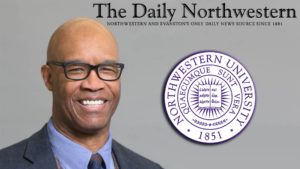Gallons of ink, mostly cyber-based, have already been spilled. More will surely flow.
This is in the wake of recent events on the campus of my alma mater, Northwestern University—events set in motion by an on-campus speech last week by former U.S. Attorney General Jeff Sessions to a group of Republican students.
From what I have gathered, The Daily Northwestern did a solid job reporting on his talk, as well as the protest of his presence on campus and general role in the Trump administration.
Then, editorial back-pedaling ensued, in the face of some students who expressed upset over certain elements of The Daily coverage—including its posting of protest photos on at least one of its social-media platforms.
On Tuesday, Charles Whitaker, Dean of the Medill School of Journalism, Media, Integrated Marketing Communications, issued a statement that addresses myriad tentacles spawned by this saga. His observations are spot-on, and if you read nothing else about this entire chain of events, I urge you to read it here.

One especially important excerpt from Dean Whitaker:
“And to the swarm of alums and journalists who are outraged about The Daily editorial and have been equally rancorous in their condemnation of our students on social media, I say, give the young people a break. I know you feel that you were made of sterner stuff and would have the fortitude and courage of your conviction to fend off the campus critics. But you are not living with them through this firestorm, facing the brutal onslaught of venom and hostility that has been directed their way on weaponized social media. Don’t make judgments about them or their mettle until you’ve walked in their shoes. What they need at this moment is our support and the encouragement to stay the course.”
Those words–in particular, “stay the course”–helped spur on the latest financial contribution from my household to The Daily Northwestern. The 138-year-old publication is where, as a sports reporter, columnist and editor, I enjoyed some of my best and most formative collegiate experiences. (And truth be told, it was my wife, also a Wildcat alum, who was the driving force behind the donation; after reading Whitaker’s statement, she couldn’t find the “Donate” button on The Daily Northwestern site fast enough.)
Some other initial reactions and reflections:
- Through each mundane story, energizing scoop, sloppy mistake, heart-wrenching encounter, and so many impossible-to-categorize pieces that I have written, here is a lesson that seeped gradually, inexorably into my soul: being a good journalist is a courageous, vulnerable, noble, messy pursuit.
2. Perfection is impossible, and excellence is not only elusive, but in the eye of the beholder. Indeed, how someone responds to a story frequently reveals much more about them than any strengths or flaws in the story itself. To wit: this entire Sessions coverage fall-out.
3. Good, old-fashioned reporting on difficult subjects has always been met with fierce resistance and come under assault. Some of my best and most important work has also been among my most reviled reporting—by a few vocal, and heavily vested, individuals. It’s human nature, after all, to try to deflect, or eclipse entirely, light that is unflattering or worse.
4. When compared with my primary time as a journalist (1984-2006), what is so dramatically different now: the weaponizing of social media. As Dean Whitaker so aptly describes it in his statement—the “brutal onslaught of venom and hostility.”
At times, journalists are the targets of that vitriol. More than ever, it is essential to develop thick skin and recognize that taking heat comes with the territory. In fact, and in my experience, it is often an indication that we are on the right track.
Related Posts:
‘The Post’: A timeless, and most timely, message about the importance of a free press
Among Medill journalism graduate students: Barack Obama & Chicago Cubs both reign
